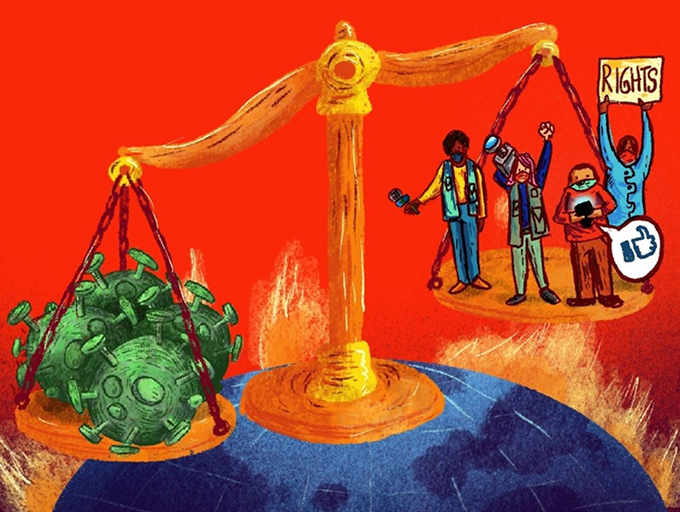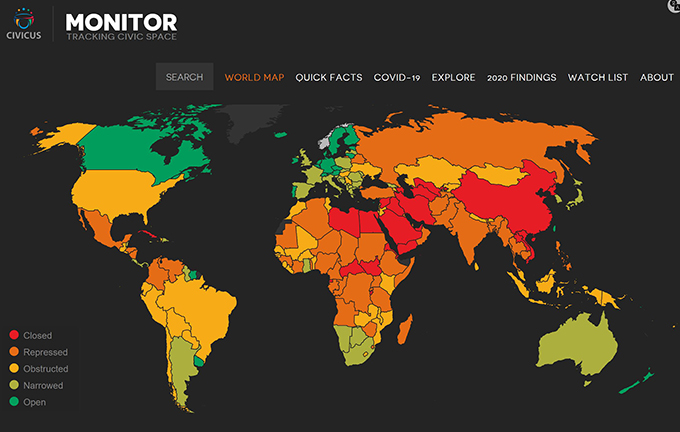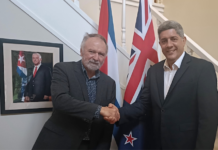
By Sri Krishnamurthi of the Pacific Media Centre
Australian authorities’ heavy-handedness and the use of the covid-19 pandemic to curb civic and media freedoms are major concerns in the latest report, People Power Under Attack 2020, released by the international non-profit organisation CIVICUS.
Australia was downgraded last year (2019) and is still rated as having freedoms “narrowed” with Fiji, Nauru and Papua New Guinea remaining in the “obstructed” category.
However, there are bright spots for civic freedoms across the Pacific compared globally with the report finding that 87 percent of the world’s population now live in closed, repressed or obstructed countries.
“For many observers, the state of civic space in Pacific may seem relatively positive. However civil society groups are concerned about the increasing use of laws to silence dissent,” said Josef Benedict, Asia-Pacific civic space researcher for the CIVICUS Monitor.
“They are also worried about attempts to censor journalists and cover up criticism, especially around governments’ mishandling of the pandemic,” he said, as reported widely in Asia Pacific Report in May.
In the Pacific region, the CIVICUS Monitor documented the use of restrictive laws against activists and critics.
Australia deployed its Intelligence Services Act to prosecute a whistleblower for disclosing the bugging of Timor-Leste government buildings in 2004, with essential parts of the trial to be held in secret.
Criminal libel laws ‘chilling’
In Fiji, the Public Order (Amendment) Act 2014 has been used to silence and prosecute critics, including trade union leader Felix Anthony, while in Samoa, criminal libel laws continue to create a “chilling effect” for those wanting to speak up and criticise the authorities, the report found.
There were concerns raised about the promulgation of a public health emergency law in Papua New Guinea which was passed hurriedly without adequate consultation and contains various provisions that could restrict human rights without adequate oversight.
Censorship was another major another violation documented by the Monitor in the region; and it was particularly concerning during a pandemic, when access to accurate information is vital.
In August 2020, Fijian Prime Minister Voreqe Bainimarama ordered the Fiji Broadcasting Corporation, which is run by Riyaz Sayed-Khaiyum, brother of Fiji’s Attorney-General Aiyaz Sayed-Khaiyum, to stop airing a debate.
n Vanuatu, media outlets were not allowed to publish articles on covid-19 without government authorisation, and in the Solomon Islands the authorities sent out a memo threatening to sack staff who post comments online criticising the government’s covid-19 response.
Tonga passed new regulations that could be used to restrict press freedom in August 2020, while Nauru continued to impose high visa fees on foreign journalists hoping to access the country to report on human rights issues.
Also alarming were reports of harassment of activists and journalists.
In Australia, even as fires and floods swept the country, environmental and climate action protesters were publicly vilified, with the Prime Minister Scott Morrison branding environmental activists as “anarchists”.

Experienced journalists attacked
In Papua New Guinea, the police minister attacked two experienced journalists in April 2020 and called for them to be sacked.
“Australia was downgraded last year to ‘narrow’ but still we continue to see restrictions on civic freedoms and a growing climate of intimidation aimed at discouraging dissent,” said Benedict.
“A range of problematic security laws have had a chilling effect on journalists and whistle-blowers. There have also been efforts to weaken privacy rights in the name of national security while stricter anti-protests laws are being pushed through.”
Despite this onslaught against civic freedoms, in the past year there have been some small victories such as the passage of the whistleblowers law in Papua New Guinea. In April 2020, four women made history by winning seats in the Kiribati parliament, the highest number of women so far.
Civil society and community groups in the region have also continued to organise and mobilise against mining, logging and development projects affecting environmental and indigenous rights, including in the Solomon Islands, Kiribati, Papua New Guinea, Australia and New Zealand.
More than 20 organisations collaborate on the CIVICUS Monitor to provide an evidence base for action to improve civic space on all continents.
The Monitor has posted more than 500 civic space updates in the last year, which are analysed in People Power Under Attack 2020.
Civic space in 196 countries is categorised as either closed, repressed, obstructed, narrowed or open, based on a methodology which combines several sources of data on the freedoms of association, peaceful assembly and expression.










































